- Clone
- A18024A (See other available formats)
- Regulatory Status
- RUO
- Other Names
- Ribosomal Protein S6, 40S Ribosomal Protein S6, Phosphoprotein NP33, Small Ribosomal Subunit Protein ES6
- Isotype
- Mouse IgG1, κ
- Ave. Rating
- Submit a Review
- Product Citations
- publications
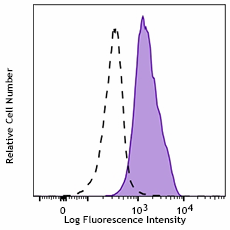
-

Human peripheral blood lymphocytes were stimulated with (filled histogram) or without (open histogram) Cell Activation cocktail (without Brefeldin A) (Cat. No. 423302) for 10 minutes, fixed with Fixation Buffer, permeabilized with True-Phos™ Perm Buffer (Cat No. 425401), and intracellularly stained with anti-RPS6 Phospho (Ser244) (clone A18024A) PerCP/Cyanine5.5.
| Cat # | Size | Price | Quantity Check Availability | Save | ||
|---|---|---|---|---|---|---|
| 935709 | 25 tests | $176 | ||||
| 935710 | 100 tests | $411 | ||||
Ribosomal protein S6 (RPS6) is a key component of the small 40S ribosomal subunit and is the major substrate of protein kinases in eukaryotic ribosomes. In response to various cellular stimuli such as mitogenic stimulation, insulin, and increased nutrient availability, upstream kinases such as RSK and p70 kinases phosphorylate RPS6 at multiple serine sites. These modifications facilitate the recruitment of the 7-methylguanasine cap complex, thereby promoting the assembly of the translational pre-initiation complex and increased cellular protein synthesis capacity. RPS6 has been shown to be hyperphosphorylated in certain cancers, and phosphorylation is a critical determinant of pancreatic β–cell size and systemic glucose homeostasis function in diabetic mouse models.
Product DetailsProduct Details
- Verified Reactivity
- Human, Mouse
- Antibody Type
- Monoclonal
- Host Species
- Mouse
- Immunogen
- Synthetic peptide corresponding to human RPS6 phosphorylated at serine 244
- Formulation
- Phosphate-buffered solution, pH 7.2, containing 0.09% sodium azide and BSA (origin USA)
- Preparation
- The antibody was purified by affinity chromatography and conjugated with PerCP/Cyanine5.5 under optimal conditions.
- Concentration
- Lot-specific (to obtain lot-specific concentration and expiration, please enter the lot number in our Certificate of Analysis online tool.)
- Storage & Handling
- The antibody solution should be stored undiluted between 2°C and 8°C, and protected from prolonged exposure to light. Do not freeze.
- Application
-
ICFC - Quality tested
- Recommended Usage
-
Each lot of this antibody is quality control tested by intracellular immunofluorescent staining with flow cytometric analysis. For flow cytometric staining, the suggested use of this reagent is 5 µL per million cells in 100 µL staining volume or 5 µL per 100 µL of whole blood. It is recommended that the reagent be titrated for optimal performance for each application.
* PerCP/Cyanine5.5 has a maximum absorption of 482 nm and a maximum emission of 690 nm. - Excitation Laser
-
Blue Laser (488 nm)
- Application Notes
-
BioLegend offers two clones against this target, A18024A and A18024B:
For western blotting, A18024B displayed a higher affinity for RPS6 Phospho (Ser244) compared to A18024A. Both clones exhibit mouse reactivity.
For ICC, A18024B displayed a moderately higher affinity for RPS6 Phospho (Ser244) compared to A18024A. Both clones are mouse reactive for this application, and both clones are compatible with Triton X-100 and methanol permeabilization steps.
For ICFC, A18024A works in all three ICFC buffers (Cat# 425401, 421002, 424401). For ICFC, A18024A weakly stains mouse RPS6 Phospho (Ser244). A18024B is not recommended for ICFC due to high background staining.
Both clones are predicted to react with rat RPS6 when phosphorylated at serine 244 due to complete sequence homology between the immunizing sequence and the rat RPS6 ortholog. - RRID
-
AB_2892496 (BioLegend Cat. No. 935709)
AB_2892496 (BioLegend Cat. No. 935710)
Antigen Details
- Structure
- RPS6 is a 249 amino acid protein with a predicted molecular weight of 28.6 kD.
- Distribution
-
Cytosol, nucleus, ER/ubiquitous expression
- Function
- Regulation of protein translation
- Biology Area
- Cell Biology, Cell Proliferation and Viability, Protein Synthesis, Signal Transduction
- Molecular Family
- Organelle Markers, Phospho-Proteins
- Antigen References
-
- Jefferies HB, et al. 1997. EMBO J. 16:3693.
- Ruvinsky I, et al. 2005. Genes Dev. 19:2199-211.
- Schumacher AM, et al. 2006. Biochemistry. 45:13614.
- Roux PP, et al. 2007. J Biol Chem. 282:14056.
- Stevens C, et al. 2009. J Biol Chem. 284:334.
- Schlafli P, et al. 2011. FEBS J. 278:1757.
- Gene ID
- 6194 View all products for this Gene ID
- UniProt
- View information about RPS6 Phospho on UniProt.org
Related FAQs
- How stable is PerCP/Cyanine5.5 tandem as compared to PerCP alone?
-
PerCP/Cyanine5.5 is quite photostable and also better than PerCP alone in withstanding fixation.
Other Formats
View All RPS6 Phospho Reagents Request Custom Conjugation| Description | Clone | Applications |
|---|---|---|
| PE anti-RPS6 Phospho (Ser244) | A18024A | ICFC |
| Purified anti-RPS6 Phospho (Ser244) | A18024A | WB,ICC,ICFC |
| APC anti-RPS6 Phospho (Ser244) Antibody | A18024A | ICFC |
| PE/Cyanine7 anti-RPS6 Phospho (Ser244) | A18024A | ICFC |
| PerCP/Cyanine5.5 anti-RPS6 Phospho (Ser244) Antibody | A18024A | ICFC |
Compare Data Across All Formats
This data display is provided for general comparisons between formats.
Your actual data may vary due to variations in samples, target cells, instruments and their settings, staining conditions, and other factors.
If you need assistance with selecting the best format contact our expert technical support team.
-
PE anti-RPS6 Phospho (Ser244)
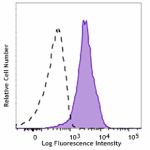
Human peripheral blood lymphocytes were stimulated with (fil... -
Purified anti-RPS6 Phospho (Ser244)
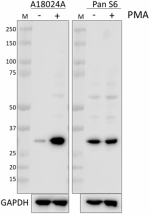
Total cell lysates (15 µg protein) from serum-starved SR cel... 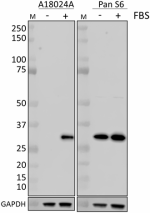
Total cell lysates (15 µg protein) from serum-starved NIH/3T... 
Serum starved NIH/3T3 cells were untreated (panel A) or trea... 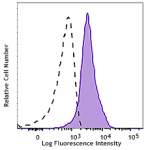
Human peripheral blood lymphocytes were stimulated with (fil... -
APC anti-RPS6 Phospho (Ser244) Antibody
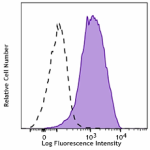
Human peripheral blood lymphocytes were stimulated with (fil... -
PE/Cyanine7 anti-RPS6 Phospho (Ser244)
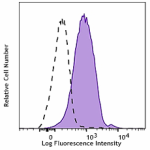
Human peripheral blood lymphocytes were stimulated with (fil... -
PerCP/Cyanine5.5 anti-RPS6 Phospho (Ser244) Antibody
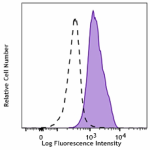
Human peripheral blood lymphocytes were stimulated with (fil...
 Login/Register
Login/Register 












Follow Us